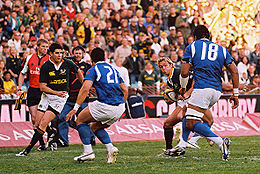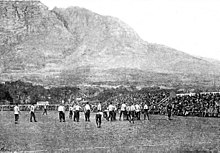
The Rugby Championship, formerly known as the Tri Nations Series (1996–2011), is an international rugby union competition contested annually by Argentina, Australia, New Zealand, and South Africa. These are traditionally the four highest ranked national teams in the Southern Hemisphere; the Six Nations is a similar tournament in the Northern Hemisphere.
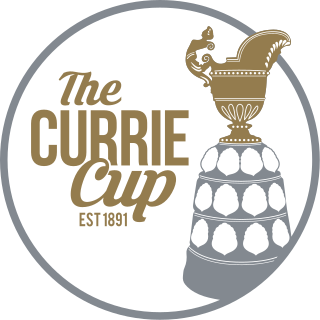
The Currie Cup is South Africa's premier domestic rugby union competition featuring teams representing either entire provinces or substantial regions within provinces. Although it is the premier domestic competition, four South African franchises also compete in the United Rugby Championship competition, including for the 'South African Shield'. for the highest placed South African team.
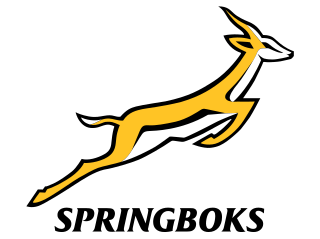
The South Africa national rugby union team commonly known as the Springboks, is the country's national team governed by the South African Rugby Union. The Springboks play in green and gold jerseys with white shorts. Their emblem is a native antelope, the Springbok, which is the national animal of South Africa. The team has been representing South African Rugby Union in international rugby union since 30 July 1891, when they played their first test match against a British Isles touring team. Currently, the Springboks are the number one ranked rugby team in the world and are the reigning World Champions, having won the World Cup on a record four occasions. Incredibly, the Springboks have won half of the Rugby World Cups they've attended. They are also the second nation to win the World Cup consecutively.

The 1995 Rugby World Cup, was the third Rugby World Cup. It was hosted and won by South Africa, and was the first Rugby World Cup in which every match was held in one country.
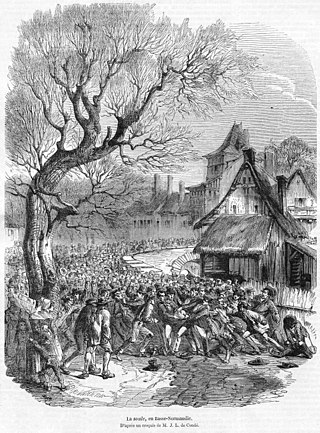
The history of rugby union follows from various football games long before the 19th century, but it was not until the middle of that century that the rules were formulated and codified. The code of football later known as rugby union can be traced to three events: the first set of written rules in 1845, the Blackheath Club's decision to leave the Football Association in 1863 and the formation of the Rugby Football Union in 1871. The code was originally known simply as "rugby football". It was not until a schism in 1895, over the payment of players, which resulted in the formation of the separate code of rugby league, that the name "rugby union" was used to differentiate the original rugby code. For most of its history, rugby was a strictly amateur football code, and the sport's administrators frequently imposed bans and restrictions on players who they viewed as professional. It was not until 1995 that rugby union was declared an "open" game, and thus professionalism was sanctioned by the code's governing body, World Rugby—then known as the International Rugby Football Board (IRFB).

Jacobus Francois Pienaar is a retired South African rugby union player. He played flanker for South Africa from 1993 until 1996, winning 29 international caps, all of them as captain. He is best known for leading South Africa to victory in the 1995 Rugby World Cup. After being dropped from the Springbok team in 1996, Pienaar went on to a career with English club Saracens.

Schalk Willem Petrus Burger Jr. is a South African former professional rugby union player. He played as a flanker for Saracens in the English Premiership and has won 86 caps for South Africa.
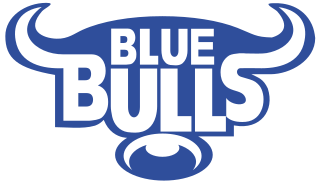
The Blue Bulls is a South African rugby union team that participates in the annual Currie Cup tournament and the United Rugby Championship. They are governed by the Blue Bulls Rugby Union and are based at Loftus Versfeld Stadium in Pretoria, Gauteng province.
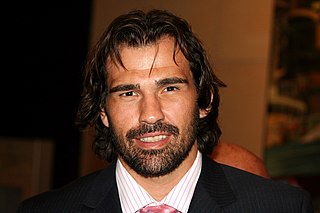
Victor Matfield is a South African former professional rugby union player. He played for and captained the South Africa national team (Springboks) as well as the Blue Bulls in the Currie Cup and the Bulls franchise in Super Rugby. He is generally considered one of the best locks to have ever played for South Africa and had a long successful partnership with Springbok and Blue Bulls teammate Bakkies Botha.

Bryan Gary Habana OIS is a South African former professional rugby union player. Playing mainly as a wing, he is widely considered to be one of the greatest players in the history of the sport. He played for the Golden Lions, the Blue Bulls and Western Province in South Africa, for the Bulls and the Stormers in Super Rugby, and for Toulon in the French Top 14, and won 124 caps for the South Africa national team.
The 2007 Tri Nations Series was an annual rugby union competition between the national teams of Australia, New Zealand and South Africa. The series began in South Africa on 16 June, with a Test between South Africa and Australia at Newlands, Cape Town and ended on 21 July in Eden Park, Auckland with a Test between New Zealand and Australia. The winners, for the third consecutive year, were New Zealand.
George Moir Christie, better known as Kitch Christie, was a South African rugby union coach best known for coaching the country's national team, the Springboks, to victory at the 1995 Rugby World Cup. He remained unbeaten during his tenure as Springbok rugby coach between 1994 and 1996, including leading the team to a then record 14 consecutive victories. In 2011, he was inducted posthumously into the IRB Hall of Fame, later subsumed into the World Rugby Hall of Fame.

Heinrich Wilhelm Brüssow is a South African former professional rugby union player. His usual position was as open-side flanker and his most recent club was Northampton Saints in the English Premiership.

Bismarck Wilhelm du Plessis is a South African former professional rugby union player, who played for the Bulls in the United Rugby Championship and for the Blue Bulls in the Currie Cup. He played for the Free State Cheetahs in 2003, before moving to the Sharks in 2005 where he spent the bulk of his career, and then to Montpellier in the French Top 14. He is widely acknowledged to be one of the best hookers of his time, both in club and country performances.
The 2008 Tri Nations Series was the thirteenth annual Tri Nations competition between the national rugby union teams of New Zealand, Australia and South Africa. The All Blacks won the series on 13 September 2008 after defeating Australia in the last match of the series.

The 2009 Tri Nations Series was the fourteenth annual Tri Nations rugby union series between the national rugby union teams of New Zealand, Australia and South Africa, respectively nicknamed the All Blacks, Wallabies, and Springboks. The Springboks secured the season crown in their final match on 12 September, defeating the defending series champion All Blacks 32–29 in Hamilton.

Eben Etzebeth is a South African professional rugby union player who currently plays for the Sharks in the United Rugby Championship and the South Africa national rugby team. He made his international debut for the Springboks in 2012 and has since won more than 100 caps. His regular playing position is as a number 4 lock.

Handré Pollard is a South African professional rugby union player who currently plays for the South Africa national team and Leicester Tigers in England's Premiership Rugby. His regular playing positions are fly-half, where he started for South Africa in their 2019 Rugby World Cup Final win, and inside-centre. He has previously played for the Bulls and Blue Bulls in his native South Africa, Osaka Red Hurricanes in Japan and Montpellier in France. He is one of 43 players who have won the Rugby World Cup on multiple occasions, 24 of whom are South Africans.
Pieter Willem Gabriel Rossouw is a South African former professional rugby player and current coach. Rossouw played wing for Western Province in the Currie Cup and the Stormers in the Super Rugby competition. He played a total of 43 times for the Springboks, making him one of the most capped Springbok wingers after South Africa's readmission to international rugby. He was also one of South Africa's most prolific try-scoring wingers, post-isolation, with only Breyton Paulse(26) and Bryan Habana(53) scoring more tries. He is 7th on the all-time try-scoring list for the Springboks. Rossouw is currently the backline coach of the Bulls in Super rugby and the Blue Bulls in the Currie Cup. He was known as "Slaptjips", apparently because the sight of his running legs was like potato chips slapping together. Pieter is the older brother of Chris Rossouw, who played flyhalf for Western Province and the Free State Cheetahs.
The History of the South Africa national rugby union team dates back to 1891, when the British Lions first toured South Africa where they played against South African representative sides. The South Africa national rugby union team played few international matches during a period of international sanctions due to apartheid. Since the end of apartheid in 1994, South Africa has once again fully participated in international rugby.
